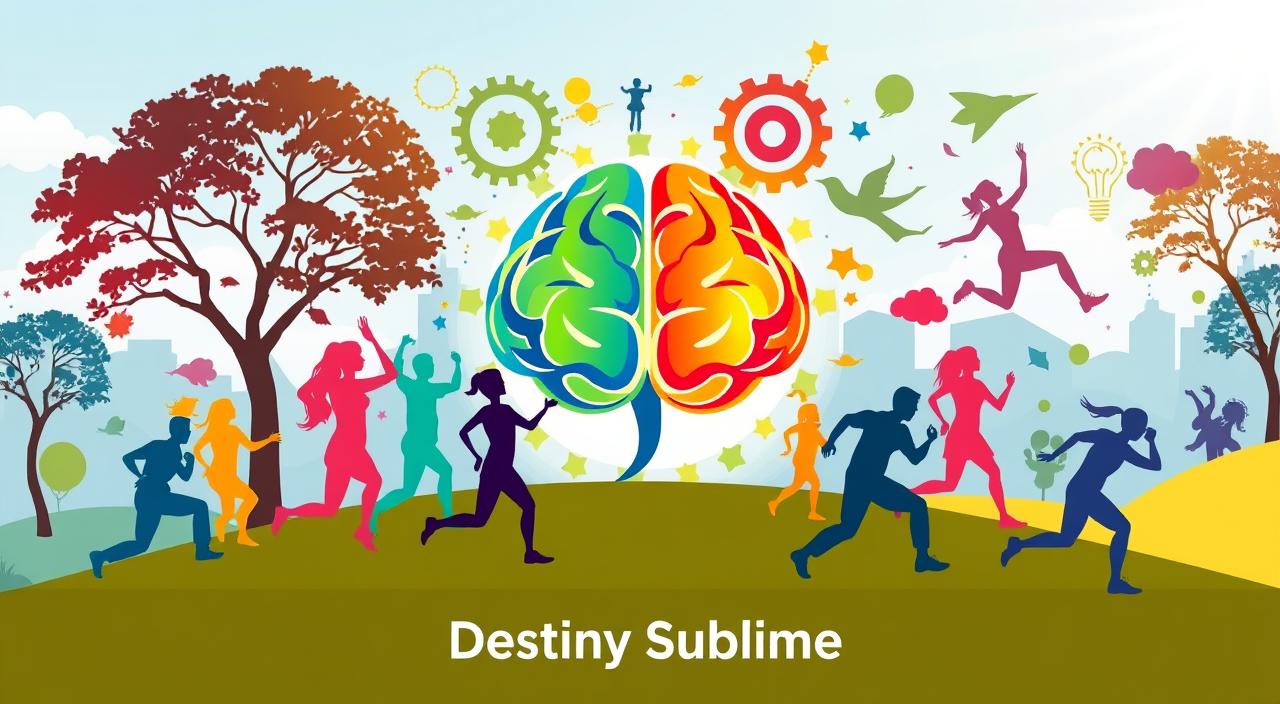Think Your Way Active And Fit: Mental Fitness Tips

Think Your Way Active And Fit: Mental Fitness Tips
Struggling to stay motivated and active? The secret to lasting fitness might be in your mind, not just your body. Learn how to think your way active and fit with these mental fitness tips. They will change how you view wellness.
How to think your way active and fit
In today’s fast world, keeping our mental fitness is key. It means we feel good about our thoughts, feelings, and actions. It’s about keeping our brain and emotions healthy, handling stress well, and choosing how we react to things.
Mental fitness is about learning to keep a positive mindset. It’s not just about dealing with mental health issues. It’s also about taking care of our thinking, feeling, and social skills.
The Definition of Mental Fitness
Mental fitness means being able to handle life and work every day, no matter what. It includes:
- Feeling good about ourselves and bouncing back from tough times
- Being good at solving problems, making decisions, and remembering things
- Having friends and a strong support network
- Being financially stable and secure
- Living a healthy lifestyle, like exercising and sleeping well
By focusing on these areas, we can find balance and mental well-being. This helps us deal with life’s ups and downs more easily.
“Mental fitness is not just about managing mental health challenges, but also about proactively nurturing our cognitive, emotional, and social well-being.”
The Importance of your mind to think your way active and fit
Mental fitness is as important as physical fitness for our well-being. It helps us deal with stress, improves our relationships, and boosts our brain power. This leads to better productivity and happiness. Building mental fitness is key to a balanced life.
Studies show that exercise boosts brain oxygen flow, making us mentally sharper. People who exercise regularly tend to think more clearly. Memory games also sharpen our minds, helping us solve problems better. Exercise can even fight depression and make us feel more positive.
Trying new things, like foods or places, wakes up our brain cells. Games like Sudoku keep our minds sharp. Reading sparks our imagination and relaxes us. Just a few minutes of mental exercises each day can make us think clearer and feel better.
Being mentally fit helps us handle life’s challenges better. The University Medical Center New Orleans offers programs to improve mental fitness. Even high-stress jobs, like the U.S. Marine Corps, use mental fitness programs to lower PTSD rates.
Exercise improves our brain function, and research links it to better thinking. Building mental strength, flexibility, and endurance is key to mental fitness.
Anxiety and depression affect millions in the U.S. But, even a little exercise can help reduce anxiety and depression symptoms. Regular physical activity also lowers the risk of depression in kids and adults.
Keeping our bodies and minds fit is essential for our well-being. By doing activities that challenge us, we can unlock mental fitness’s many benefits.

Components of Mental Fitness
Mental fitness includes four main parts: emotional, social, financial, and physical. Working on these areas helps you stay well-rounded and mentally fit.
Emotional Fitness
Emotional fitness is about accepting yourself, being resilient, and handling stress and negative feelings. Mindfulness, journaling, and therapy can help you understand your emotions better. They also teach you how to deal with tough times.
Social Fitness
Having good friends and family is key to mental fitness. Being part of a community can make you feel more connected and happy. It also helps your brain and emotions stay strong.
Financial Fitness
Being financially stable is important for your mental health. Managing money well can reduce stress and let you focus on other things. Getting help with money matters can make a big difference.
Physical Fitness
Physical fitness means living a healthy lifestyle. This includes exercising, eating right, and sleeping well. Exercise can make you feel better, reduce anxiety, and improve your thinking skills. Eating well and sleeping enough also helps your mind stay healthy.
| Component | Description | Benefits |
|---|---|---|
| Emotional Fitness | Self-acceptance, resilience, and emotional management | Improved stress coping, enhanced self-awareness |
| Social Fitness | Meaningful social connections and support network | Increased sense of belonging, improved cognitive function |
| Financial Fitness | Financial stability and effective money management | Reduced stress and anxiety, improved focus |
| Physical Fitness | Healthy lifestyle habits, including exercise, nutrition, and sleep | Improved mood, reduced symptoms of anxiety and depression, enhanced cognitive function |
Working on these four areas of mental fitness helps you feel your best. It lets you reach your full mental and physical abilities.

Think Your Way Active And Fit
Being active and fit isn’t just about exercise. It starts with mental fitness. A positive mindset and strategies to overcome obstacles are key to lasting wellness.
Mental fitness helps you think your way active and fit. It lets you:
- Stay motivated and committed to your fitness routine, even on days when you’d prefer to skip it
- Develop resilience to overcome setbacks and barriers that may derail your active lifestyle
- Make healthy choices that support your physical well-being, such as eating nutritious foods
- Enhance your cognitive function, leading to increased productivity and a greater sense of fulfillment
When you think your way active and fit, you’re not just improving your physical fitness. You’re also boosting your mental fitness for a holistic approach to wellness. This integration makes an active lifestyle a natural and enjoyable part of your daily routine.

Remember, mental fitness is the foundation for physical fitness. Embrace the power of your mind. Let it guide you towards an active and fit life that nourishes your body, mind, and spirit.
Mindfulness and Metacognition
Learning to watch our thoughts and feelings without judgment is key to better mental health. This skill, called metacognition, is tied to mindfulness. Through meditation and staying in the moment, we improve our metacognitive abilities. This lets us respond wisely, not just react instinctively.
Mindfulness makes us more aware of the now. It lets us see our thoughts clearly and accept them. This awareness is the heart of metacognition – knowing how we think.
When we can watch our thoughts without getting lost in them, we can choose how to face challenges. This way, we avoid falling into bad habits.
The Power of Mindfulness and Metacognition
By growing mindfulness and metacognition, we understand ourselves better. This self-awareness lets us make smarter choices. It improves our emotional control, decision-making, and overall happiness.
- Mindfulness keeps us focused on the now, reducing stress and anxiety.
- Metacognition lets us step back and see our thoughts, helping us respond thoughtfully.
- Together, mindfulness and metacognition boost self-control, resilience, and adaptability.
Adding mindfulness and metacognition to our daily lives changes us for the better. These skills help us handle life’s ups and downs with clarity, kindness, and confidence.

“Mindfulness is the aware, balanced acceptance of the present experience. It isn’t more complicated than that. It is opening oneself to the present reality.” – Sylvia Boorstein
Cognitive Restructuring
Cognitive restructuring is a key to mental fitness. It helps us change negative thoughts into positive ones. This way, we can think healthier and feel better overall.
Understanding cognitive distortions is important. These are thought patterns that can make us stressed, anxious, or depressed. Examples include thinking everything is all-or-nothing, catastrophizing, or making “should” statements.
Knowing these can help us change our thoughts to more balanced ones.
Tools like Socratic questioning and guided imagery are great for changing our thoughts. Socratic questioning helps us check if our thoughts are based on facts. Guided imagery lets us see things in a more positive light.
“Cognitive restructuring is a therapeutic process that helps clients challenge and modify their negative thoughts, with a focus on reducing stress through cultivating positive thought habits.”
Cognitive restructuring is vital in therapies like Cognitive Behavioral Therapy (CBT) and Rational Emotive Behavioral Therapy (REBT). These therapies help us deal with mental health issues like depression, anxiety, and PTSD by changing our negative thoughts.
Practicing cognitive restructuring regularly can change our negative thoughts into positive ones. This can greatly improve our emotions, behaviors, and life quality.
Building Mental Fitness Habits
Mental fitness is like physical fitness, needing regular practice and healthy habits. Simple yet effective daily habits can boost your mental strength and improve your thinking. setting goals, and practicing gratitude can change your life for the better.
Journaling for Self-Reflection
Journaling is a key mental fitness tool. It helps you understand yourself better and deal with life’s ups and downs. It’s a way to release stress and anxiety, helping you feel better.
Setting Meaningful Goals
Setting goals is vital for mental fitness. Goals can be anything from learning a new skill to improving your finances. Breaking down big goals into smaller steps keeps you focused and motivated.
Practicing Gratitude
Gratitude is a simple yet powerful mental fitness practice. Reflecting on the good things in your life each day can make you more positive. Sharing your gratitude with others can greatly improve your well-being.
Building mental fitness habits is a journey, not a finish line. By making these practices part of your life, you can unlock your mind’s full power. This leads to a more fulfilling and balanced life.
| Mental Fitness Practice | Benefits |
|---|---|
| Journaling | Improved self-awareness, stress management, and emotional regulation |
| Goal-Setting | Increased motivation, focus, and sense of accomplishment |
| Gratitude Practice | Enhanced positive emotions, optimism, and overall well-being |
“The greatest weapon against stress is our ability to choose one thought over another.” – William James
The Benefits of Mental Fitness
Getting mentally fit can change your life in big ways. It makes your personal and work life better. You’ll have better relationships, think clearer, feel happier, and be more confident. Plus, you’ll start to make healthier choices.
Mental fitness helps a lot in your relationships. You’ll handle tough times better and connect deeper with others. This makes your personal and work life richer and more meaningful.
It also makes your brain work better. Mindfulness, meditation, and thinking things through can improve your memory and problem-solving. This means you’ll be more productive and creative.
Being mentally fit also makes you feel better. You’ll feel more joy, gratitude, and happiness. This leads to a life that’s more balanced and less stressful.
It also boosts your confidence. As you challenge yourself mentally, you’ll feel more accomplished and sure of yourself. This confidence can spread into many areas of your life.
Lastly, mental fitness helps you make better choices. When you focus on your mind, you’re more likely to take care of your body too. This includes eating right, exercising, and being mindful. These habits can greatly improve your health and happiness.
| Benefit | Description |
|---|---|
| Improved Relationships | Enhanced communication, empathy, and resilience in personal and professional relationships. |
| Cognitive Function | Improved memory, attention, problem-solving, and overall intellectual performance. |
| Positive Emotions | Increased feelings of joy, gratitude, and contentment, and reduced stress. |
| Confidence | A growing sense of self-belief and accomplishment, translating to various areas of life. |
| Healthy Habits | Adoption of lifestyle choices that nourish both body and mind, such as exercise, proper nutrition, and mindful practices. |
Embracing mental fitness opens up a world of growth and happiness. Start taking care of your mind today. You’ll see the many benefits it brings.
Overcoming Obstacles
Building mental fitness is not always easy. It’s important to face and solve any problems that come up. These can be things like not having enough time, feeling unmotivated, or lacking support. But, with the right approach and help, you can beat these hurdles and keep moving forward.
Seek Professional Support
If you’re finding it hard to stay mentally fit, think about talking to a mental health expert. They can give you tailored advice, share proven therapies, and teach you ways to deal with problems. Getting help from a therapist or counselor is a smart move for your mental health.
Join a Support Group
Meeting others who are going through similar things can really help. Joining a support group, whether in person or online, can give you a sense of belonging and help you stay accountable.
Sharing your ups and downs with others who get it can make you feel less alone and more ready to tackle challenges.
Enlist the Help of a Coach
A mental fitness coach can be a big help in your journey to better mental health. They can help you figure out and tackle specific problems, create plans just for you, and keep you motivated. Whether it’s one-on-one or group coaching, a coach can offer the support and guidance you need to get past obstacles.
Remember, improving your mental fitness is a journey. It’s key to be kind and patient with yourself. By facing and solving the problems you meet, and getting the right support, you can overcome any hurdles and keep focusing on your mental health.
Integrating Mental and Physical Fitness
For true well-being, we need to mix mental and physical health. The mind-body connection shows how our mental and physical health are linked. By focusing on both, we can boost energy, resilience, and live a more balanced life.
Many studies show the benefits of mixing mental and physical health. For example, a randomized clinical trial found that exercise helped schizophrenia symptoms. Also, yoga therapy is effective for schizophrenia patients. These results show how exercise helps our mental health.
Mental health practices like mindfulness and meditation also help our bodies. Yoga programs for teachers reduced stress and improved mental health. Exercise helps prevent depression relapse.
To mix mental and physical health, try these tips:
- Do regular physical activities like walking, jogging, or strength training to improve mood and brain function.
- Use mindfulness, like meditation or deep breathing, to handle stress and control emotions.
- Try activities that mix mind and body, like yoga, Tai Chi, or outdoor activities, for a complete wellness experience.
- Make self-care a priority, like getting enough sleep, eating well, and staying connected, for both mental and physical health.
By understanding the connection between mental and physical health, we can start a journey to better wellness. Our mind and body will work together to improve our life quality.
“Exercise isn’t just about losing weight. It’s about improving mental and physical health, feeling accomplished, reducing stress, and gaining energy.”
Key Takeaways
- Mental fitness is just as important as physical fitness for overall well-being.
- Developing a healthy mindset, positive thinking, and brain-training strategies can boost motivation and help you achieve your fitness goals.
- Mindfulness techniques like meditation can enhance cognitive function, focus, and emotional resilience.
- Consistent practice of mental fitness habits leads to increased confidence, reduced stress, and improved physical health.
- Integrating mental and physical fitness is the key to a truly active and fit lifestyle.
Conclusion
Developing mental fitness is key to a full and active life. It helps you think clearly and live well. By being mindful and changing your thoughts, you can start to think your way active and fit
Mental and physical fitness go hand in hand for true wellness. This approach helps you face challenges and reach your goals. It’s a way to live a balanced and healthy life.
Mental fitness is vital for our health and happiness. It boosts our thinking, relationships, and work performance. Start your mental fitness journey now for a better life.
The path to mental fitness takes time and effort. But with persistence, you can grow mentally strong. Let your mind lead you to a fulfilling and active future.
FAQ
What is mental fitness?
Mental fitness is feeling good about ourselves and our actions. It’s about keeping our minds and emotions healthy. It also means being strong against stress and making good choices.
Why is mental fitness important?
Just like our bodies, our minds need fitness too. It helps us deal with stress and improves our relationships. It also boosts our brain power, making us happier and more productive.
What are the key components of mental fitness?
Mental fitness has four main parts: emotional, social, financial, and physical health. These areas work together to keep us well.
How can I think my way active and fit lifestyle?
Mental fitness helps you get motivated and make healthy choices. It lets you overcome challenges and stick to your fitness goals. This way, you can live a healthier life.
How can mindfulness and metacognition help with mental fitness?
Mindfulness, like meditation, helps us think about our thoughts and feelings. This skill lets us choose how we react, not just react.
What is cognitive restructuring, and how can it improve mental fitness?
Cognitive restructuring changes negative thoughts into positive ones. It helps us think more positively and improves our mental health.
How can I build mental fitness habits?
Building mental fitness is like exercising your mind. It involves journaling, setting goals, and doing things that make you happy. These habits make your mind stronger.
What are the benefits of developing mental fitness?
Mental fitness brings many benefits. It improves our relationships, boosts our brain power, and makes us happier. It also helps us build healthy habits.
How can I overcome obstacles in my mental fitness journey?
Overcoming mental fitness challenges is important. Seek help from professionals or join groups for support. This helps you stay on track and overcome obstacles.
Why is it important to integrate mental and physical fitness?
Combining mental and physical fitness is key to well-being. Our minds and bodies are connected. By focusing on both, we get more energy and a balanced life.



